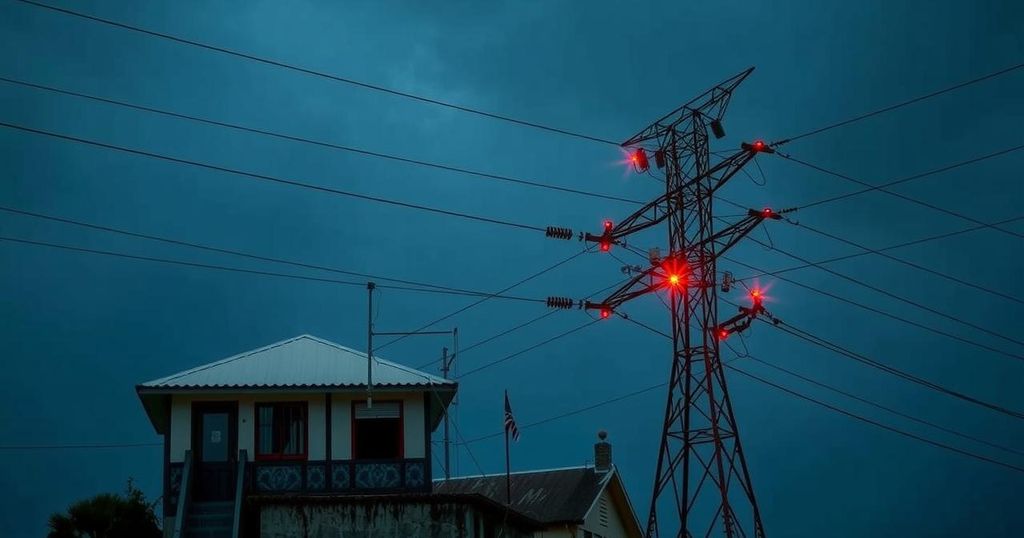Cuban Power Crisis Intensifies as Hurricane Oscar Approaches

Millions of Cubans are without power for a third day as Hurricane Oscar approaches, compounding the crisis. Efforts to restore electricity have failed repeatedly, leading to widespread disruption. The situation is dire for essential services, and public protests have begun due to frustrations over the government’s handling of the crisis. Health services are operating with generator support amidst the outages.
As Hurricane Oscar approaches, millions of Cubans continue to experience power outages for the third consecutive day. The Cuban Electrical Union announced that approximately 16% of the population had power restored, but these efforts were thwarted when the aging electrical grid overloaded once more late Saturday night. Officials have yet to provide a timeline for the restoration of full service, leaving the 10 million residents in the dark since the initial grid failure on Friday. The situation is further complicated by the arrival of Hurricane Oscar, which made its initial landfall on Inagua Island in The Bahamas with maximum sustained winds of 80 mph, according to the National Hurricane Center’s early Sunday updates. Oscar is projected to impact the northeastern coast of Cuba later today, potentially exacerbating the crisis. Since the major power plant failure that triggered the first nationwide blackout on Friday, Cubans have faced an ongoing series of outages. The energy disruptions threaten to plunge the island into an even deeper crisis, as many services, including water supply and food preservation, are contingent on reliable electricity. In the capital city of Havana, residents have been seen queuing for hours in search of basic necessities such as bread. Amidst the crisis, individuals have turned to social media platforms such as WhatsApp to share information on which neighborhoods currently have power, and some have organized to temporarily store essential medications in homes with access to electricity or functioning generators. Despite the power outages, tourists can still be seen navigating the streets of Havana in classic mode cars, although the operations of many hotels have been severely hindered due to generator failures. Travelers reported that José Martí International Airport was functioning solely on emergency power, which has disrupted ticket printing and eliminated air conditioning in the terminal. The Cuban government has attributed the ongoing energy crisis to a combination of various factors, including heightened economic sanctions imposed by the United States, recent hurricane-related disruptions, and the overall dilapidated state of the country’s infrastructure. In a recent address, Cuban Prime Minister Manuel Marrero Cruz stated, “We have been paralyzing economic activity to generate (power) to the population.” Of further concern, Health Minister José Angel Portal Miranda confirmed that health facilities are currently relying on generators to maintain operations amidst the outages. Protests regarding the power situation have erupted, with witnesses reporting demonstrations occurring in the capital overnight. The stark reality of the crisis has led many to question the role of Cuba’s traditional allies, such as Venezuela, Russia, and Mexico, in providing support during these challenging times.
Cuba has been grappling with longstanding issues related to its electrical infrastructure, which is characterized by aged technology and insufficient maintenance. The country’s power grid has faced repeated collapses, often exacerbated by natural disasters and economic constraints. In times of crisis, the country relies heavily on support from international allies, yet recent sanctions and geopolitical tensions have complicated these relationships. The impending Hurricane Oscar adds another layer of urgency to the current situation, with fears of further damage to infrastructure and disruptions to recovery efforts. The government’s response has involved prioritizing essential services, particularly in healthcare, but public frustration is palpable as basic needs are not being met and protests emerge.
In summary, the ongoing power crisis in Cuba has escalated as Hurricane Oscar approaches, leading to widespread outages affecting millions. The government has responded by attempting to limit economic activity in order to preserve power, yet public outcry continues over the handling of the situation. With infrastructure vulnerabilities at the forefront, the island’s ability to recuperate remains uncertain amidst both weather challenges and international pressures.
Original Source: www.cnn.com






